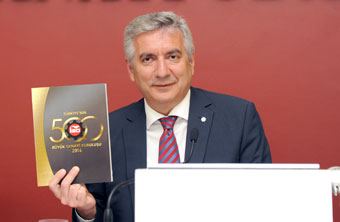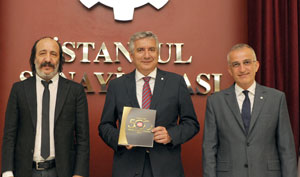News
ICI Announced the ICI’s “Türkiye’s Top 500 Industrial Enterprises 2014” Survey Results
- 16.06.2015
- News

Istanbul Chamber of Industry (ICI) announced Türkiye’s Top 500 Industrial Enterprises 2014 survey results to public at a meeting held in Odakule. According to the data, jointly announced by the ICI Chairman Erdal Bahçıvan, Deputy Chairmen Adnan Dalgakıran and İrfan Özhamaratlı, the top industrial enterprise, just like last year, was once again Tüpraş with TL 37 billion 501 million production-based sales. The ICI top 500 increased their net sales by 3.9% reaching TL 473 billion accounting for 40.7 of Türkiye’s industrial export.
The survey revealed that Türkiye’s largest enterprises were mainly petrochemical, automotive and iron-steel companies and the runner up and second runner up in the survey belonged to Ford Automotive with TL 10 billion 539 million production-based sales and Oyak-Renault –the third runner up of the previous year- with TL 8 billion 777 million production-based sales.
According to the ICI Top 500 Industrial Enterprises survey, companies, whose operating revenues reached TL 30 billion, spent TL 16 billion for funding, a sum slightly higher than half of their operating revenues. EBITDA, another critical indicator related to operating revenue, also regresses. The EBITDA of the Top 500 Industrial Enterprises declined to 10.7% from 11% of previous year.
Total employment amounted to 580 thousand, corresponding to a 5.3% increase from the year before. Companies’ fixed assets to total assets ratio fell from 50% to 46%, and the number of companies who registered a loss saw a sharp decline from 129 to 83.
Thanks to the hyper active FX rates and cyclical effects as well as the positive contribution of some companies’ FX positions, the profitability of the top 500 grew in 2014.
Total debt to equity ratio, one of the most decisive parameters of a company’s healthy financial base, maintained the high level of the previous year at 132%.
Based on 2014 data, the ratio of low-technology usage among the companies was 40%, medium-low technology usage 37%, medium-high technology 19% and high-technology usage stood at 3%.
The report revealed that Top 500 allocated 0.7% of their production-based sales to R&D, and the number of foreign-invested companies fell back to 126 in 2014.
ICI Chairman Erdal Bahçıvan pointed out that the operating profit of the Top 500 Industrial Enterprises witnessed a serious fall back declining by 6.4% compared to 2013, to TL 30 billion. Bahçıvan said “What’s fundamental for us is the operating profit of the industrialists. The fact that this figure has declined is quite disturbing. Non-operating facilities positively contributed to the profitability rise. However, the fall of the profits coming from the companies’ main operations, which is the industry, should never be overlooked”.

Bahçıvan, furthermore told that the survey brought out to light that the industrial enterprises should focus more on technology and value added, that finance management turned out to be as important as production and that a growth without the industry was unsustainable.
Bahçıvan talked about how the industry gradually has been losing its weight within the economy over the last 15 years, and how it has moved away from the level it deserved instead of approaching it. Bahçıvan, also mentioning the upsetting outlook of the 2015 first-quarter data, said: “The data shows that the economy grew by 2.3% in the first-quarter of 2015, whereas manufacturing industry grew only by 0.8%, affirming the quality growth problem we have been voicing for some time now. Growth was mainly consumption based. Everyone, concerned about Türkiye’s future, should acknowledge this vicious circle. Moreover, the responsibility of decision-makers and us, the industrialists, is to break this vicious circle and reverse this trend. It is obvious that our industrialists have been defeated by the FX pressure and interest rates”.
Bahçıvan evaluated the fundamental indicators of the ICI 500 with the following remarks:
“Companies’ total sales in 2014 went up by 3.9% compared to 2013, reaching TL 473 billion. However, it’s distressing that 8.2% of this rise fell behind the 2014 inflation figure.
We also notice that the operating profits of the Top 500 slightly dropped compared to the previous year. The Top 500, who succeeded in increasing their operating profits to 8% in 2013, unfortunately experienced a decline back to 6.4% in 2014, corresponding to a decline from TL 36 billion in 2013 to TL 30 billion in 2014.
I have already mentioned that last year almost half of the companies’ operating profits were spent for funding costs.
This year’s outlook, unfortunately, shows a similar trend. When we consider the top 500s’ operating profits, which is related to the main operations of the companies, there is regrettably a serious downfall.
The top 500 industrial enterprises, back in 2013, had spent TL 19 billion for funding, which was more than half of their TL 36.5 billion operating profits. Similarly this year also, the top 500 spent TL 16 billion for funding, still more than half of their TL 30 billion operating profits.
EBITDA, another important indicator related to the operating profit which we used for the first time last year, is also a further proof of the regression in operating profits. EBITDA of the top 500 went down from 11% the previous year, to 10.7% in 2014.
Having said that, despite the harsh competition in the domestic and global markets and the declining profit ratios and the fact that our industrialists had to make sacrifices from their main operations, 2014 ended successfully, as shown on the table. The profitability of the top 500 that was TL 22 billion in 2013 enjoyed a 22% increase and reached TL 27 billion in 2014.
The hyper activity of the FX rates and the cyclical factors as well as the favorable FX positions of some companies helped this trend to play out.
I would like to strongly emphasize that despite the profitability decline in their main operations, our industrialists’ willingness to produce and resistance in this uphill struggle is no doubt worthy of appreciation, however it is not sustainable by any means”.
Following his assessment of the ICI 500 Survey, Erdal Bahçıvan, the Chairman of the Istanbul Chamber of Industry (ICI), answered the questions of the press.
ICI Chairman Bahçıvan told that the downward trend in the operating profits of the ICI Top 500 was worrisome from the point of the industry’s sustainability and that an operating profitability of 6% makes it harder to accomplish the goals of competing, investing and carrying Türkiye to targeted levels.
On another front, the falling number of foreign-invested industrial companies also shows that the industry is not viewed as a desirable investment point compared to the previous four to five years. On this topic, Bahçıvan said: “We believe that partnering with foreign companies mostly in non-industrial areas will neither contribute to Türkiye’s sustainable growth in the long-run nor to the improvement of the industry’s quality”.
Bahçıvan, commenting on how better and healthier the industrialists in Türkiye benefit from their FX positions compared to the past, continued with the following comments: “The analysis we carry out shows that the companies are not as negatively affected by the unfavorable FX fluctuations as in the past, thanks to certain protective measures they take against this trend. That is a positive indicator proving that the Turkish industry is much more successful when it comes to financial management and much less sensitive in the face of risks”.
Erdal Bahçıvan’s answer to one of the questions was: “As industrialists, we are not against construction or construction companies. The right type of construction projects in Türkiye will surely add value to the industry. However, the tendency to seek the future in the construction sector while leaving industrial operations aside, deeply worries us both in terms of Türkiye’s future and the sustainability of both the industry and the construction sector”.
Erdal Bahçıvan, telling that everyone agrees that it’s high time for Türkiye to start an economic growth period fed by the industry, continued: “We hope for this consensus to turn into action. We are not against construction or construction companies, but we are strongly defend that shifting from one sector to another, abandoning all industrial savings will not benefit Türkiye”.
ICI Chairman drew attention to the fact that the industry in Türkiye works with a non-funding debt, apart from the equity, and that this situation is neither healthy nor sustainable.
ICI Chairman urged to overcome this reluctant approach of the recent periods to attract employment to industry and said: “Unfortunately when young people are looking for jobs for the first time, most of them don’t prefer the industry sector, but the services, finance and construction sectors or the public sector after they pass the KPSS (State Personnel Examination) exam. This breakdown must change. Permanent and promising employment is possible with the industry sector”.
Chairman Bahçıvan, commented that although Türkiye grew by 2.3% in the first-quarter of 2015, the share of the industry in this period was one of the lowest of the recent years. He then went on:
"Regrettably, the extremely negative financial circumstances of the first half of the year, the elections and the adverse developments in the globe, currently prevent us from drawing a rosy picture for 2015. I don’t expect the second half to be any different. Although certain circles still anticipate a more than 3% growth for 2015, there is a risk that the growth may be lower than that of the previous year. The current course of events forecast a growth rate of 2%.”
When asked about the post-election outlook and coalition efforts, the ICI Board Chairman Erdal Bahçıvan answered as follows:
"As Türkiye, we are going through a post-election period that we are not accustomed to in the last years. As our respect and faith in democracy requires we have to tolerantly live and observe this process of how the election results, which are the requirement of the democracy as well as its most important finale, will finalize. For long years, we somewhat forgot how the coalition negotiations and bargains were made. But this is the process we are going through right now. We need to believe that at a moment of coalition, the democratic maturity process in Türkiye, by also taking into account the lessons learned in the past, will reach a different consensus and form a culture of joint success. In this point in time, we need to act as a role model in terms of reaching a consensus, striking a balance, obtaining positive results after bringing together different ideas in the same pool and acting upon them. This is what would fit the democratic maturity of Türkiye, of our political parties and our leaders. For this reason, the negotiation process should patiently be monitored by all social stakeholders. I would like to underline one more time that we need to be tolerant towards all political parties and leaders until the negotiations reach a certain level of maturity”.
Bahçıvan also noted that if this is the current picture vis-à-vis coalition, this should be evaluated with very positive energy for the sake of Türkiye’s economic future. He then made the following comments: “The most important stakeholder of democracies is the electorate. If the electorate has decided something, that decision should be respected by everyone and should be evaluated within the same respectful framework and be finalized accordingly”.